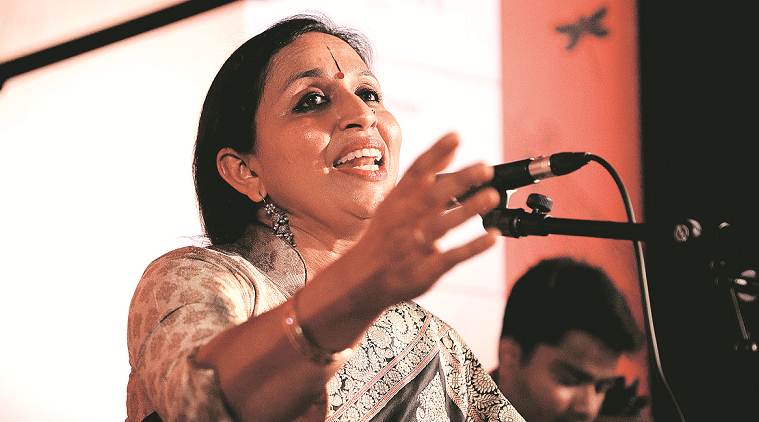
The past comes alive in the voice of classical vocalist Vidya Shah, who strives to create conversations with her music, for she believes that music must present the time it is in and must be accessible to people. This is precisely why her performances and projects bring together stories, visuals, music, poetry, and text, along with issues of gender and sexuality for the listeners. “People like stories and contexts and know what they are listening to. Traditional doesn’t mean from the stone age, it must keep evolving and as I create these bridges between the past and present, I do not step out of my grammar of learning. I know how to use my voice and understand how it lends to certain genres and am mentally versatile to create new compositions, while I am rooted,” says Shah.
The artiste was in Chandigarh upon the invitation of the Hoshiarpur Literary Society, along with author William Dalrymple, for an evening that brought alive stories and times of India’s last Mughals, as Dalrymple read out from his award-winning book The Last Mughal while Shah gave life to the words with her voice.
From Begum Akhtar to Faiz Ahmad Faiz, language of the Sufiana kalam to collaborations with jazz musicians in Europe, Shah says music has no limitations. With her initial training in Carnatic music and later guidance in Hindustani classic genres of khayal from Shubha Mudgal and thumri dadra and ghazal from Shanit Hiranand, it gave her insights into the many layers of music.
Shah’s latest work is Jalsa: Indian Women and Their Journeys from the Salon to the Studio (Tulika Books), a book that is an extension of her project, ‘Women on Record’, a performance that highlights contributions by the forgotten performers in the gramophone era, for which she received a senior fellowship from the Government of India. A multi-media presentation, it brings out stories that unfold the world and stories of women performers in the field of music, theatre and films. The show is infused with vocals, folk music, thumri, geet and film songs, anecdotes and videos with archival images. The performance is a story of the baijis in the early 20th century gramophone era and has travelled to several places. The book, says Shah, is an attempt to document the oral stories and find out who these incredible women were, from where they learnt music, what were the challenges they faced, the sociopolitical influences on their work. “Apart from academic writing, not much was available about the social history of Indian music. I decided to push my creative energy towards research, contextualising the music, as I was committed to share this past with the audience,” says Shah, adding that the process was rigorous and energising.
The book, adds Shah, attempts to give an insight and perspective on the beginnings of the interface of technology and entertainment, and the impact this had on how we enjoy and consume music. “The book lends itself to great visuals and my husband Parthiv, a photographer, is part of the project. The book looks at the life of these chosen ones, issues of gender, what were the British thinking when they set up this entire enterprise of the gramophone, the music traditions in different part of the country at the time, and how the labels evolved. We have highlighted the life of a few women such as Gauhar Jan, Anjanibai Malpekar, Begum Akhtar, Jaddanbai, Mehboobjan, Zohrabai, Amirbai and Rajkumari, and also music arrangers and historians, through essays, as we look at the nationalist movement, how hierarchy came into play, moving to the talkies and playback. Libraries, the National Film Archives, old records, private collectors, the references were many,” she says.
Gramophone technology, says Shah, emancipated female performers who became the first women anywhere in the world to appear on the public stage, paving the way for singing stars of today. “They improvised new genres, took risks with their singing and braved taboos. The narrative is simple, with anecdotes and incidents, as I spoke to legends such as Girija Devi, Birju Maharaj, Sharmila Tagore and Shyam Benegal to get insights into this space of performance, which has various intersections. I sing the songs from the recordings of the baijis and bring to fore the many beautiful meanings and moments embedded in the music,” says Shah, adding they now also have a documentary titled Indian Women on Record.